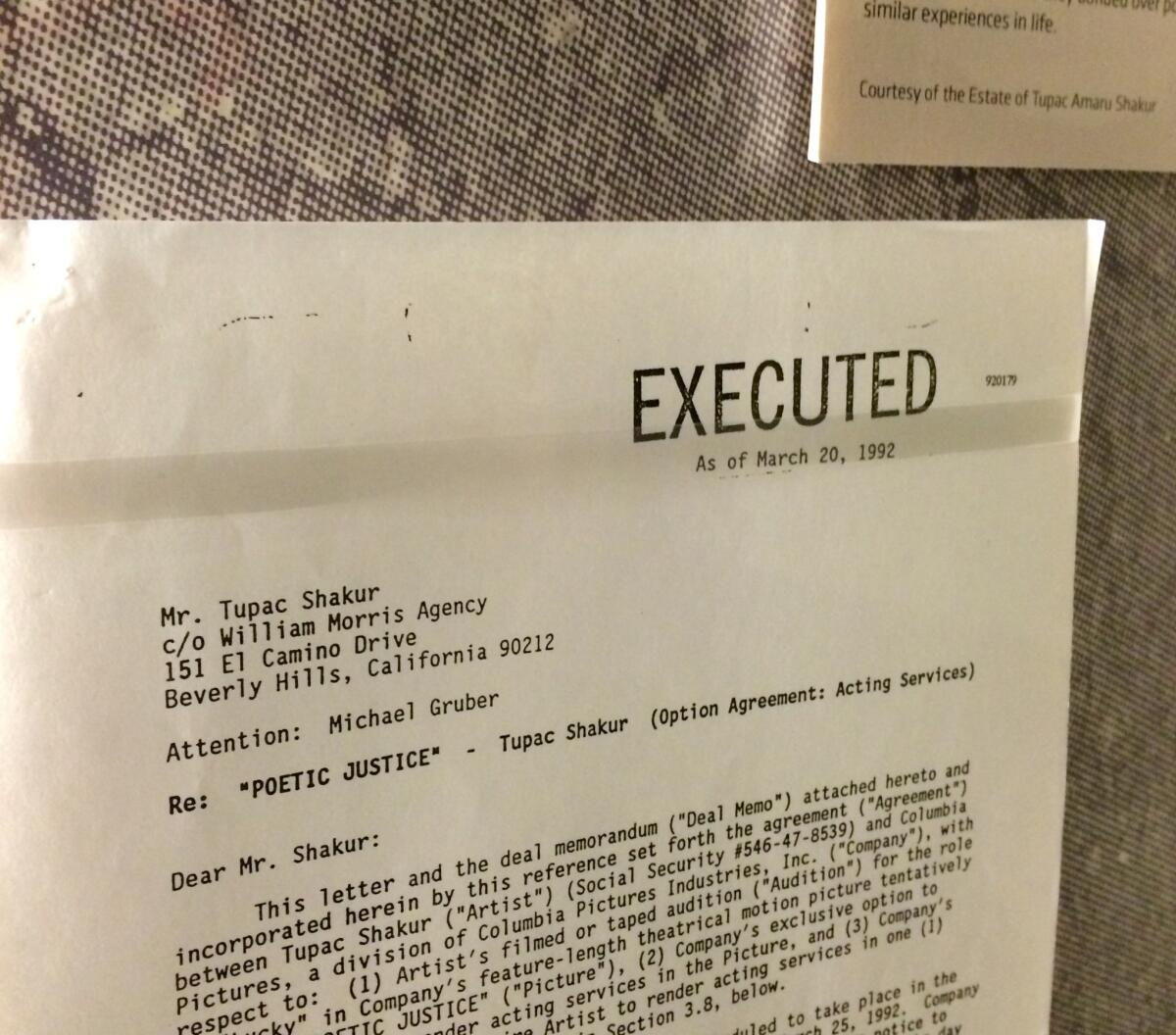Tupac Shakur exhibit at Grammy Museum showcases his ambitions

- Share via
Tupac Shakur never scored a Grammy, but more than 18 years after his death, the revered rapper’s legacy and short life is being celebrated with an exhibit at the Grammy Museum.
“All Eyez on Me: The Writings of Tupac Shakur,” which opened Monday, showcases his lyrics and poems while tracing his career from his early work with hip-hop collective Digital Underground to his rise as one of the most prolific voices of early West Coast gangster rap.
Working with the late rapper’s estate, which is overseen by his mother Afeni Shakur, the exhibit boasts an impressive breadth of never-before-seen artifacts exploring his creative process, thoughts and many ambitions beyond gangster rap.
“We wanted this exhibit to explore deeper into hip-hop and we wanted to take away the stigma of him being just a gangsta rapper or a thug,” the exhibit’s curator, Nwaka Onwusa, said, adding that the Grammy Museum was the first to have a gallery dedicated to Shakur.
“To get these lyrics adds to the value. You can see all his scribbled-out words,” Onwusa added, “and that’s important given that the written word is such a lost art form.”
Across the modest space -- it’s impossible not to note the vast spread of country pop diva Taylor Swift’s exhibit compared with the tiny slice dedicated to Shakur -- his hit song titles are strewn across glass displays, with music videos and interviews on a continuous loop on multiple screens.
Handwritten poetry, including “The Rose That Grew from Concrete” and early verses dedicated to his mother, is displayed alongside the numerous notebooks. One contains the lyrics of his debut, “2Pacalypse Now” and the cover is inscribed with “Never Ignorant Getting Goals Accomplished,” his powerful reshaping of a racial epithet that had already been flipped into slang, below a crudely drawn gun.
Pads containing written lyrics to “Brenda’s Got A Baby” and “Much 2 Young to Die” show Shakur’s prowess as a lyricist and storyteller. Most of his drafts are neat compositions, save for words he wanted to add to verses and small notes to himself.
Shakur also wrote out concepts, by hand, for mostly everything.
A video treatment for “2 of Amerikaz Most Wanted,” his 1996 hit with Snoop Dogg, is written out on a yellow pad. And he plotted out what he intended as his third album, “Stay True” on a single sheet of notebook paper. He penned the album’s track sequence and outlined the record’s concept as being “4 Me!!!” (emphasis on the exclamation marks) and planned on the release to close a trilogy of related discs that included his debut and sophomore effort. The record was never released but songs were reworked into his group Thug Life’s 1994 debut.
Shakur eventually moved into acting -- his agreement for his role in “Poetic Justice” is displayed -- but he wanted to go behind the camera as well.
A handwritten screenplay for a film called “32 Bottles 2 Ghetto Heaven” can be seen, as is a typed-up script for a feature titled “Live 2 Tell,” which he penned in 1995 while he was incarcerated for sexual abuse. (A written testimony about an incident while locked up at Clinton Correctional Facility in New York is displayed.)
The exhibition also includes Shakur’s plans for other business ventures, including a flow chart for the empire he intended to create along with plans for a restaurant called Powamekka Cafe, which he alliteratively described as “a passionate paradise 4 people with power 2 play and parlay.”
Outfits like the black pinstripe Versace suit he wore to the 1996 Grammys (he presented alongside KISS, but Naughty By Nature bested him for that year’s inaugural award for rap album) are displayed, as is his Death Row jacket.
Memorabilia from the infamous label, which was at the center of infamous West Coast-East Coast rivalry that ultimately resulted in Shakur’s shooting death, was light. It’s a possible salve for dedicated fans who subscribe to the theory that the label’s notorious co-founder, Marion “Suge” Knight, at the wheel of the BMW in which Shakur was shot by a gunman in another vehicle, had some involvement in the slaying.
In a grim twist, the exhibit opened the day Knight has been charged with murder and attempted murder after a fatal hit-and-run that followed an argument in Compton last week on the set of “Straight Outta Compton,” a biopic about the group N.W.A.
The opening was paired with a panel featuring the rapper’s friends and collaborators including Outlawz member Edidon, former Digital Underground member Money-B, Public Enemy’s Chuck D, director John Singleton, producer Quincy Jones III and Ray Luv, a member of Shakur’s early group Strictly Dope. Shakur’s family, including his mother and aunt, were also among the attendees.
“Tupac was not only a revolutionary artist, he was an evolutionary [one],” said writer Cheo Coker, who moderated the discussion. “That’s why his music resonates right now. You think about things like Ferguson and New York and he would have been there. He was us, he was all of us.”
The exhibit, which takes its title from Shakur’s 1996 album, runs through April 22.
Twitter: @GerrickKennedy
And to get more entertainment news on Facebook, like our Facebook page.
More to Read
The biggest entertainment stories
Get our big stories about Hollywood, film, television, music, arts, culture and more right in your inbox as soon as they publish.
You may occasionally receive promotional content from the Los Angeles Times.











